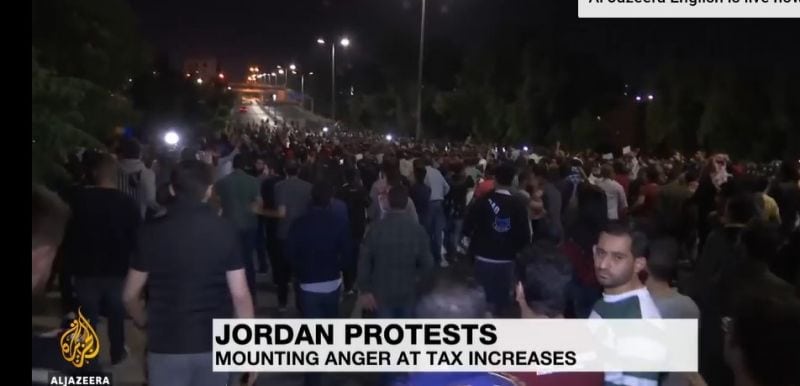The Jordan Government’s proposed income tax bill last month has shaken the entire kingdom with hundreds of Jordanians taking to streets of the Jordanian capital Amman in fourth consecutive night protests.
Demanding the cancelation of the proposed Bill which has been sent to Parliament aimed at raising the taxes of Jordanian employees up to 5 percent while increasing the taxes on companies by 20 to 40 percent, protestors now also demand the PM Hani Mulki to step down from his position.
The demonstrators who gathered near the cabinet office chanted slogans: “We are here until we bring the downfall of the bill… This government is shameful,” while the security forces prevented them from reaching the offices.
The protestors vowed to disperse only when the Government declares the proposed bill as null and void.
“Our demands are legitimate. No, no to corruption,” the protestors yelled urging King Abdullah II, to intervene the issue. Thousands of protestors came together responding to a call by the Trade Unions of the nation.
As many as 3000 people were restrained from entering the Prime Minister’s office in Amman in early wee hours of Sunday holding Jordanian flags and signs that read “we will not kneel”.

“Women have started looking in rubbish bins to find food for their children, and every day we’re hit by price hikes and new taxes,” said one of the protesters who say the nation is gravely struck due to increasing taxes.
Another protestor and a Bank employee Mohammad Shalabiya, 28, said the demonstrators wanted “to tell the government that the citizen’s income isn’t suitable for this kind of law and that we have a right to demonstrate”.
According to Jordan’s official Petra news agency, the protest only ended after the Senate announced to discuss “ways of dealing with draft law… in the interest of all parties”.
Jordan’s Senate speaker Faisal al-Fayez said looking at the current scenario there was indeed a need for “comprehensive national dialogue” on the proposed law.
The Senate says the Jordanian government should “balance economic challenges and pressures with the interests of different social sectors”, but shall also be cautioned against violence asking the authorities to bring justice to those who are “troublemakers”.
The Government took these measures since the capital has already secured a $723m three-year credit line from the International Monetary Fund in 2016.
And since January, Jordan is seeing a repeating price increase affecting even the simple basic goods price such as bread. The High unemployment in Jordan which doesn’t have many natural resources, people are now subjected to pay huge tax for even simple foods.
With the beginning of 2018, fuel prices have also risen for at least five times now with electricity bills have been shooting up to 55 percent since February.
The IMF-backed measures are now believed to be one of the biggest economic protests in past five years.
The hundreds of protestors have also demanded PM Mulki to leave the nation with chanting slogans like “the ones raising prices want to burn the country” and “this Jordan is our Jordan, Mulki should leave”.
Jordanians believe it is their right to demonstrate. Speaking of the issue, Lina Rsheidat, a 35-year-old housewife says the proposed law was “unjust” and would “harm the Jordanian people”.
According to the recent official estimates collected, 20 percent of Jordanians are on the verge of poverty while 18.5 percent of the population remains.
Recently The Economist Intelligence Unit had earlier this year ranked Jordan’s capital as one of the most expensive in the Arab world.
With Syria’s devastating seven-year since 2011, as many as one million refugees have arrived in Jordan to survive, worsening the state of Jordan’s struggling economy.
The national capital Amman has repeatedly urged the international countries to provide extra funds to help the economy.
On Saturday, PM Mulki had a meeting with trade union representatives but failed to reach an agreement.
While Jordanian’s federation of unions Head Ali Obus, demands the capital should “maintain its independence and not bow to IMF demands”.
Responding to the ongoing proposed bill crisis, King Abdullah II called on parliament to lead a “comprehensive and reasonable national dialogue” on the new tax law saying, “It would not be fair that the citizen alone bears the burden of financial reforms.”
Out of 130 representatives, a majority of 78 representatives are opposed to the new tax law.

